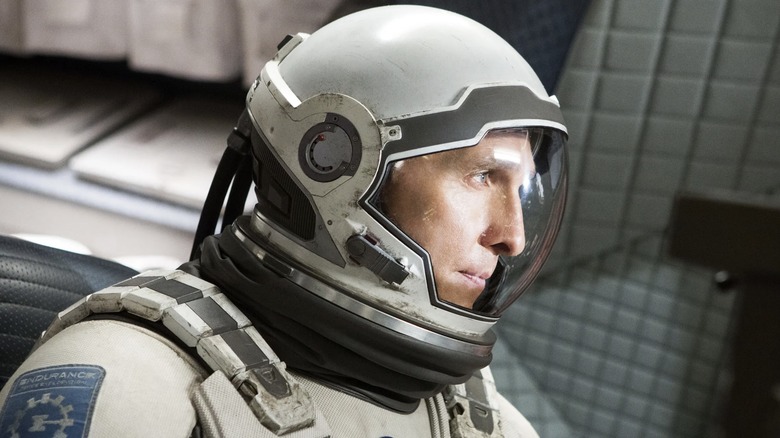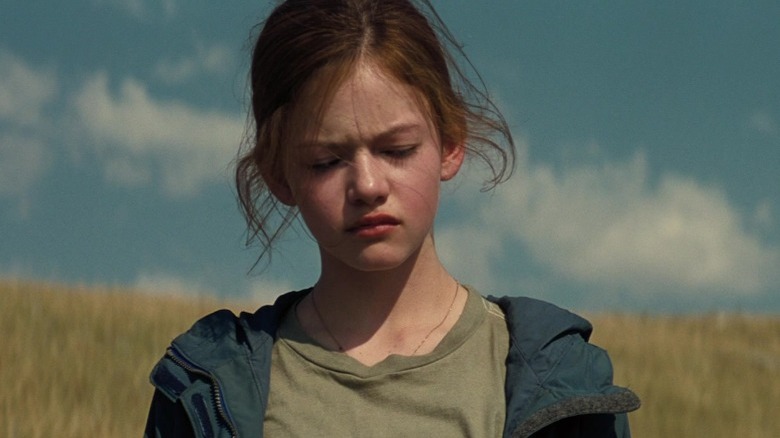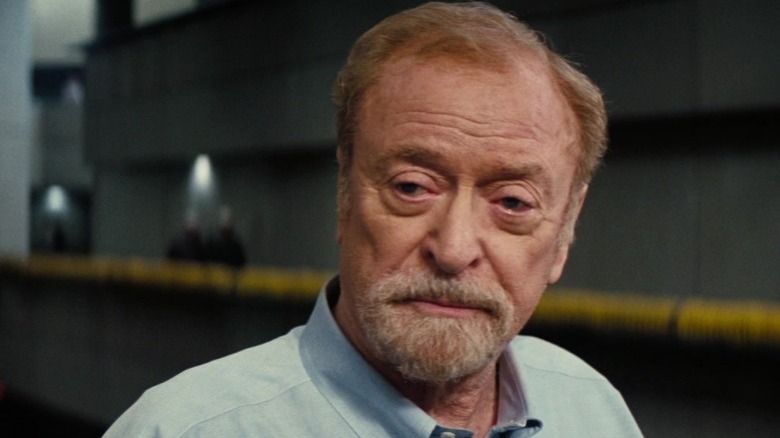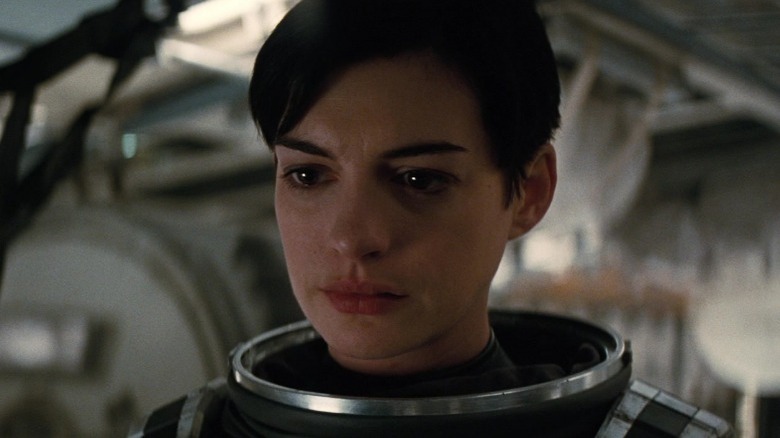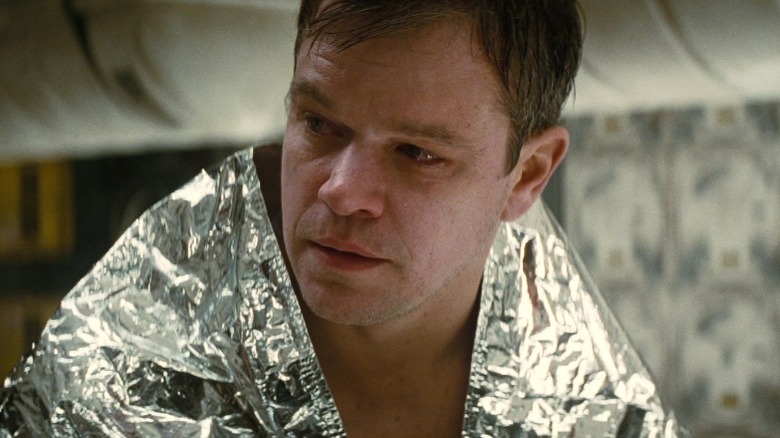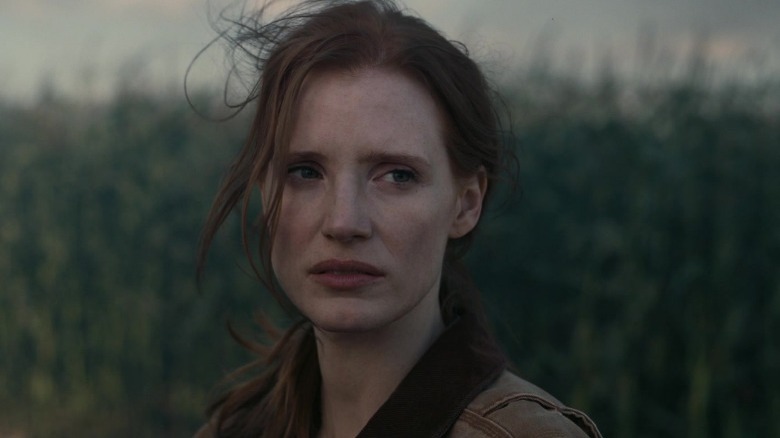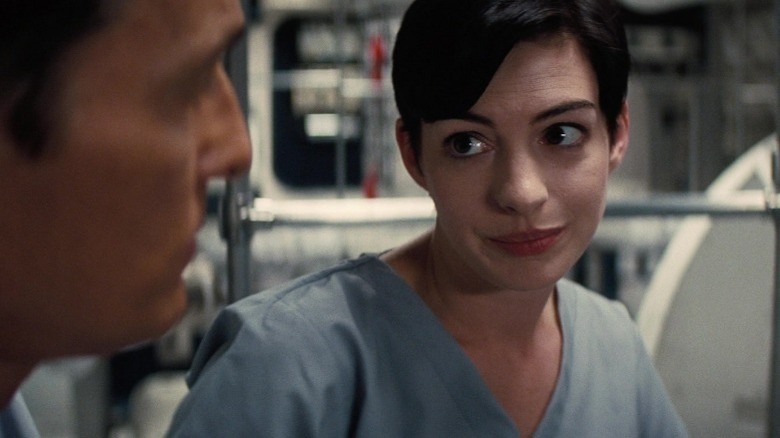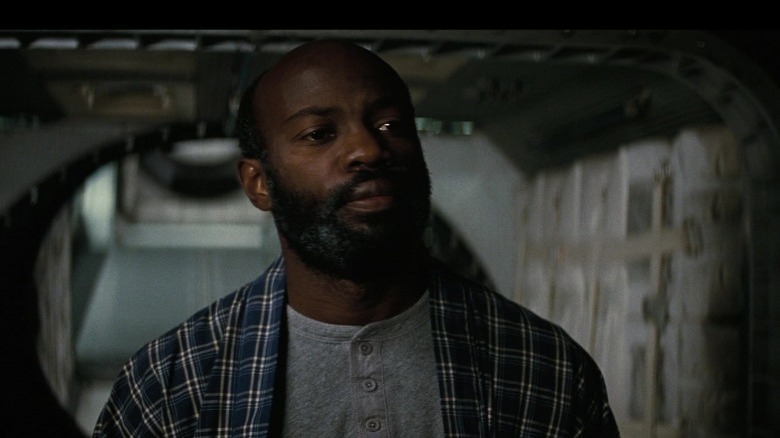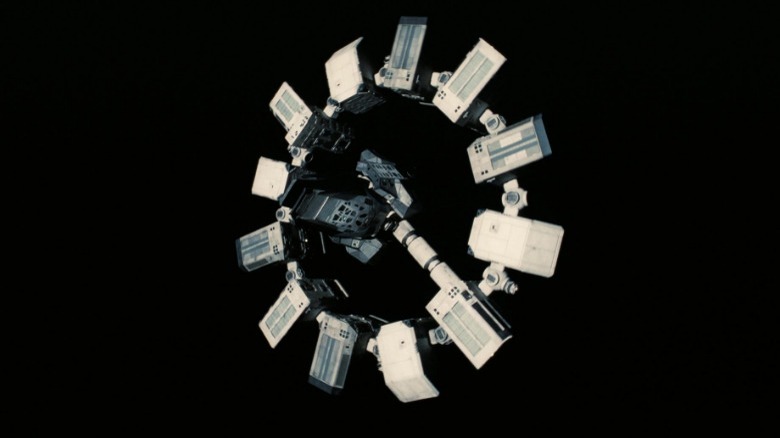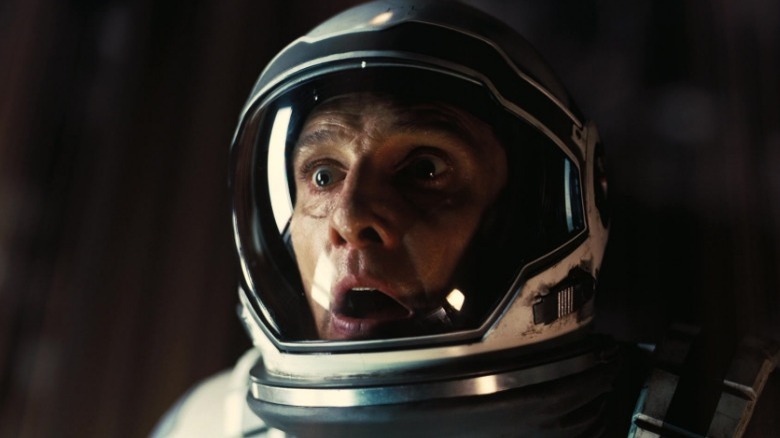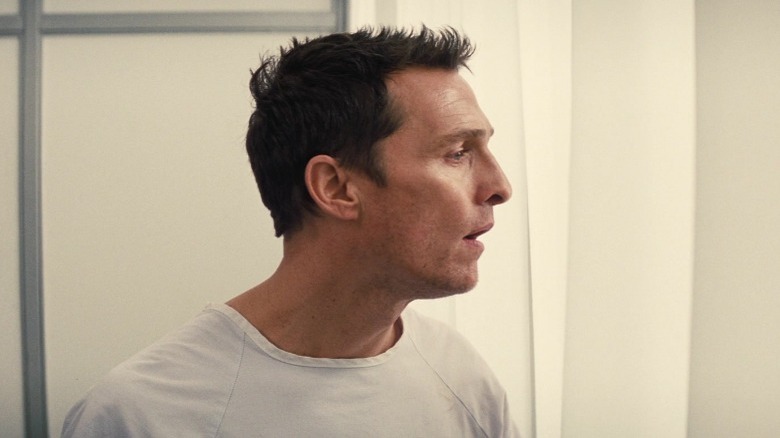Fan Theories About Interstellar That Would Change Everything
You know it's a Christopher Nolan movie if fans are still debating theories long after the film's release. While "Interstellar" may not be as mind-bending as "Memento" or "Inception," it still leaves plenty for audiences to think about. Fans have proposed a lot of fascinating theories about "Interstellar" that, if they're true, would change the entire movie. For instance, what if "Interstellar" is loaded with Biblical allusions? Or what if the fifth-dimensional beings who help save Earth are actually the ones who got Earth into this mess to begin with?
Before reading any further, we suggest that you review the ending of "Interstellar." The ending is complicated enough already before throwing various fan theories into the mix, so it's imperative that you are familiar with what happens in the movie, along with the generally-accepted interpretation of what the ending means. Once you feel confident you can wrap your mind around the time dilation and fifth-dimensional travel from the movie, you can dive into these thought-provoking fan theories.
What if all other animals on Earth are extinct?
To guess that all the animals on Earth died before the movie begins is hardly a radical theory. In fact, it's a logical explanation for the eerie lack of animals. Reddit user u/gstba carefully studied all the scenes on Earth and couldn't find a single glimpse of any fauna. Surprisingly, this is never explained or even acknowledged, so any answer to the animal question is pure speculation, and "Interstellar" fans have plenty of ideas.
Most fans agree that all of Earth's wildlife has either starved because of the blight or been killed for food. After all, writes u/Komrk888 on Reddit, "Would we listen to poaching laws [if] we were all starving?" Sooner or later, though, humanity would have forsworn meat altogether, because "meat requires even more plants to grow," points out u/ghost_monk. Still, wouldn't there be more repercussions if animals went extinct? For instance, with no bees, there would be no pollination, and the crops would die even sooner.
According to u/Komrk888, it's awfully strange that NASA never seems to consider saving any animals in their mission to save Earth. Maybe they're so desperate to save humans that they abandon every other species. Or maybe they pull a Noah's Ark, but it happens offscreen. The only part of the movie where viewers can hear animal noises in the background is on the Cooper Station at the end, observes u/gstba, who adds, "I presume they must have stored some [animals] for possible reproduction later, like they did humans."
What if they actually were aliens?
At the beginning of "Interstellar," NASA assumes that the fifth-dimensional beings who created the wormhole (aka "they") are extraterrestrials trying to help Earth. However, by the end of the movie, Cooper (Matthew McConaughey) concludes that "they" are actually the humans of the future, who have achieved fifth-dimensional travel and are helping humanity escape Earth.
That's a bit of a wild guess. It's certainly possible that these five-dimensional beings are descended from the "Plan B" embryos that Amelia Brand (Anne Hathaway) takes to Edmund's planet. But ultimately, Cooper has no way of knowing; he's just going by a gut feeling. According to Reddit user u/kentonj, this is no more certain than Brand's theory that love is quantifiable. "Yes, she believed it," writes u/kentonj, "but that doesn't make it ... reality [in] the world of 'Interstellar,' it just makes it her opinion." The only things we know are definitely caused by humans are the messages that Cooper sends his daughter in morse code and binary. This doesn't explain who created the wormhole or the tesseract. For all we know, u/kentonj adds, "Maybe it was just some chill a** aliens, or even some cosmic coincidence."
The alien theory actually makes more sense, because if the wormhole was created by the humans of the future, it might potentially create a time paradox, as Redditor u/waveform points out. Arguably, the wormhole shouldn't even exist, since the creation of the wormhole is contingent on humanity surviving long enough to create one.
What if Interstellar creates a paradox?
Perhaps the most confusing moment in "Interstellar" is the reveal that the wormhole that allows the Endurance to explore new planets and the tesseract that allows Cooper to send a message to Earth were both created by humans from the future. Many fans have speculated that this scenario would create a time paradox. How could "they" have created the wormhole in the future if, without the wormhole, humanity would have never lived long enough to create the wormhole? Blogger Taylor Holmes summed it up perfectly: "If you don't survive to create time travel, you cannot save yourself through time travel."
However, other fans have argued that it's not a paradox at all. "It was just a self-fulfilling time loop," writes u/JamEngulfer221 on Reddit. That is, there will always be a wormhole, because "they" will always go back in time and create it, and history cannot happen any other way. Meanwhile, u/an7agonist points out that the fifth-dimensional beings don't experience time the same way we do. They can move through time the same way we move through three-dimensional space. For them, past/future and cause/effect are meaningless, thus making it possible for the effect (Earth receiving Cooper's message) to happen before the cause (Cooper sending the message).
Ultimately, the answer depends on how time travel works in the world of "Interstellar." Does it operate more like "Back to the Future" (where the past can be changed) or "Harry Potter and the Prisoner of Azkaban" (where the past appears to be fixed)?
What if they expect something in return?
Let's face it. Nobody just does something to be nice, not even the enlightened fifth-dimensional beings from the future. Why do they help Cooper save Earth? Obviously, it makes sense why "they" would want to prevent the extinction of the human race, otherwise "they" would never exist. But technically, "they" only need to open the wormhole; "they" didn't need to rescue humanity from Earth (aka Plan A). Assuming that these fifth-dimensional beings are descended from the civilization that Amelia plants on Edmund's planet (i.e. Plan B), their survival doesn't depend on the survival of anybody back on Earth. "They" certainly have no reason to bend over backward to reunite Cooper with Murph (Jessica Chastain). Entertainment Weekly wanted to know why these beings are "nice enough to bend the rules of space and time for Cooper when most of the other people in the movie die pointless deaths."
One Reddit user might have some insight into their motivations. "Perhaps the beings ... wanted to say thank you," writes u/kentonj. After all, it's Cooper's sacrifice in the black hole that makes all this possible. Or maybe there are strings attached. Perhaps, like the heptapods in the end of "Arrival," these beings are dealing with a crisis in the future, and they hope that the humans of the past can give them something in return. For instance, maybe Cooper's generation can offer "biodiversity, gene diversity, or simply a jump start in learning" to the humans of the future, suggests u/kentonj.
What if they introduced the blight to Earth?
The blight in "Interstellar" is so hard to escape because it's unlike anything ever seen on Earth before. Perhaps this is because the blight isn't from Earth. What if it was actually created by the humans from the future, who unleash this biological weapon on a helpless Earth?
But wait, aren't "they" the good guys? To be honest, we have no way of knowing. The fifth-dimensional beings could be benevolent, or they could have an ulterior motive, but even if "they" only have humanity's best interests at heart, the blight might be the only way to save humanity. "Maybe they created the blight as a catalyst to help nudge these stupid people to explore space," speculates u/zxbc on Reddit. If so, that would be morally questionable on a number of levels. But to be fair, it does achieve the desired result.
Of course, it's possible that "they" unleash the blight on humanity not because they want to, but out of necessity. Maybe "they" need to create the blight and close the "time loop," because if they don't, humanity will be stuck on a dying Earth and "they" won't even exist. (This raises a whole slew of questions about free will.)
In a later post, u/zxbc ventures that maybe the fifth-dimensional beings are actually trying to destroy humanity with the blight, yet humanity manages to survive despite the odds. Then, in an ironic twist, humans develop enough advanced technology to ultimately become the fifth-dimensional beings.
What if Cooper and Brand are a couple?
"Interstellar" ends with Cooper crossing the universe in search of Amelia, leading many fans to speculate whether or not the pair are meant to be an item. Reddit users such as u/cloaked90 were quick to notice that Cooper and Amelia are both single. As far as u/pureracingevolution is concerned, there are flirty undertones in the exchange between Cooper and Amelia after they first launch into space. This Redditor adds, "I'd love to see them, or just love imagining them, ending up together like some bad a** Adam and Eve of the future."
However, many fans see their relationship as purely platonic. "Maybe it's less of a romance thing and more of a 'you're the only person in the universe with shared life experience let's hang out' thing," writes u/LuckeyHaskens. By the end of the movie, almost everybody Cooper knew from Earth is dead, so it makes sense that he would be drawn to Amelia even if he has no romantic feelings for her.
In the end, most fans agree it's best that the movie doesn't offer a definite answer. Taking the time to develop a romantic subplot would only hurt the film. "The strongest driving force behind Cooper's character is love for his daughter, and Amelia is driven by love for Edmunds," points out u/mybffndmyothrrddt, so a romance between the two of them would undermine their motivations. Of course, it's certainly nice that the movie's ending leaves the possibility of romance open.
What if Mann didn't booby-trap his robot?
Spending more than a decade alone on his planet, Dr. Mann (Matt Damon) has plenty of time to think. All his actions seem to be carefully orchestrated. Mann tells his rescuers that his planet is habitable when it's not, and when they want to access the data that the robot KIPP has collected, Mann makes excuses for why they can't. He even tries to kill Cooper. So it follows that, when Romilly (David Gyasi) dies in an explosion trying to access KIPP's data, that's premeditated, too. After all, setting KIPP to self-destruct would allow Mann to kill two birds with one stone: destroy the proof that he falsified data about his planet and eliminate the only witnesses.
However, one Reddit user has another theory. According to u/jbarbz, KIPP actually chooses to self-destruct. Maybe the robot knows its objective is to save humanity, and it realizes that sending out a signal to lure rescuers to Mann's planet will sabotage the mission, so KIPP self-destructs to end the signal and save the mission. Perhaps Mann disables the robot while it's counting down to self-destruct, and the robot simply resumes its self-destruct process when Romilly turns it back on.
Clearly Mann intends to murder Cooper, but perhaps he would have left Amelia and Romilly alive. "I can't let you leave with that ship," Mann tells Cooper. "We're gonna need it to complete the mission." This suggests that he intends to continue the mission with Amelia and Romilly.
What if the motif of 12 is a Biblical reference?
Fans who watch "Interstellar" more than once will notice that the number 12 appears repeatedly. There are 12 astronauts on the Lazarus mission exploring 12 different planets, and the Endurance is divided into 12 equal sections. What's up with that? Is it Christopher Nolan's lucky number?
The most popular interpretation is that Nolan uses the motif of 12 because there are 12 numbers on a clock (and the Endurance resembles a clock, points out u/Crescento on Reddit). This matches the movie's themes about time. However, some fans feel the number 12 is significant for a different reason. Reddit user u/Mebbwebb noticed an interesting connection: "12 apostles. Mann was judas." Other Reddit users draw more Biblical parallels. "Lazarus is a Bible reference too," points out u/luxaeterna101, while u/negative34 observes that if the 12 astronauts are the apostles, that would make Cooper almost like Jesus: "[Cooper] 'dies' to save humanity and then comes back." By extension, Cooper and Brand might be comparable to Adam and Eve, adds u/Gnarmac.
This theory actually makes a lot of sense. Like Judas, Mann betrays Cooper, and he does this out of selfishness (his desire for self-preservation nearly dooms humanity) and pride (believing that his right to live trumps everybody else's). So perhaps Mann is meant to symbolize sin. Earlier in the movie, Amelia insists that she doesn't believe nature can be evil. Maybe instead the real evil is mankind (embodied by Mann, of course).
What if Cooper actually dies in the end?
For any fans who felt disappointed by the ending of "Interstellar" because it seems too convenient that Cooper is rescued by fifth-dimensional beings, here's another possible way to interpret the ending: what if Cooper actually dies in the black hole? That would mean that everything we see after this moment is a hallucination conjured up by his dying brain. Blogger Taylor Holmes argues that Cooper merely imagines himself saving humanity and seeing his daughter again because he feels guilty about leaving Murph behind.
Morbid as this theory may be, it certainly has merit. After all, Dr. Mann tells Cooper that his children's faces are the last things he'll see before he dies. This might simply be foreshadowing what happens at the end of the movie. What's more, the glimpse of baseball being played on the space station could simply be Cooper's memories of the baseball game from earlier in the story, which are now bleeding into his fever dream (per Cinemablend).
If Cooper never sends the data he discovered in the black hole to Earth, everybody on Earth (including Murph) dies. But Plan B has better luck. Holmes theorizes that Amelia spends the rest of her life alone on Edmund's planet and succeeds in populating it, so that humanity (in a sense) can go on. In this interpretation, there are no fifth-dimensional beings, there is no rescue, and the "ghost" Murph sees in her bookshelf is no more real than Cooper's dying hallucination. Pretty depressing, right?
What if Cooper dies, but still saves humanity?
If you think that Cooper's reunion with his daughter is an unrealistic ending, but you don't want the film to end on the depressing note of "everybody dies," we might have just the theory you're looking for.
Let's suppose that yes, Cooper dies in the end, and yes, he never gets to see his daughter again, but still manages to save Earth. How? One Reddit user speculates that maybe Cooper's death is what allows him to travel through the fifth dimension. "During life, we perceive space-time in four dimensions, with time being an unstoppable, one-directional continuum," writes u/iosonic. Yet whenever a person dies, they transform into a five-dimensional being who exists outside of time. According to u/iosonic, it's normally impossible for the dead to contact the living, because fifth-dimensional beings can't pinpoint an exact moment in time. Yet occasionally somebody's will to survive is so strong that their emotional connection with the living can briefly bridge two different dimensions. This is what allows Cooper to communicate with Murph from the fifth dimension (or beyond the grave, whichever you prefer). It's worth noting that this theory lines up with Amelia's hypothesis that love is a force that transcends dimensions.
If this fan theory about "Interstellar" is true, then it would change the entire movie. Rather than wrapping up the movie with a happy ending that many fans (including u/DatDude2012) felt was rushed, the film would end on a bittersweet note.
